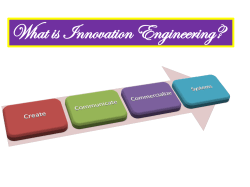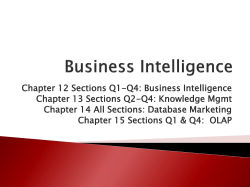
Further Particulars for Ref
Further Particulars This document includes information about the role for which you are applying and the information you will need to provide with the application. 1. Role details Vacancy reference: 11069 Job title: Research Assistant / Associate (Urban Data Mining) Reports to: Research Fellow Salary: Ranging from £28,695 – £37,394 Terms and conditions of service: Full time Research Staff Grade: AC1 / AC2 Duration of post: Until 31st December 2016 Working hours: 37 hours per week (full time Monday to Friday) Location: Knowledge Media Institute of The Open University Closing date: 23 March 2015 Type of application form accepted: Standard / long version (plus covering letter) Number of referees required: Three Unit recruitment contact: kmi-recruitment@open.ac.uk Human Resources HRG158 Issue 2 February 2015 Page 1 of 5 2. Summary of duties On 1st January 2014 The Open University (OU) launched MK:SMART, an OU-led consortium of local and national partners engaged in a £16m Smart City, Big Data initiative which will develop innovative solutions to support economic growth in Milton Keynes. Central to the project is the creation of a state-of-the-art ‘MK Data Hub’ which will support the acquisition and management of vast amounts of data relevant to city systems from a variety of data sources, such as, specially deployed energy, transport and water sensors, satellite sources, social and economic datasets, and crowd sourced data from social media or specialised apps. The data hub will include advanced data integration, analytics and mining services, providing developers with state-of-the-art techniques to abstract valuable information from heterogeneous datasets. We are currently looking for a Research Assistant/Associate to conduct research into such analytics and mining services in the context of the MK:Smart project. The appointment will be made on the Academic Grade 1 or 2 Salary Scales for Research Staff, ranging from £28,854 – £37,298 pa depending on qualifications and experience. Appointment as a Research Associate requires a PhD or three years equivalent in quality of achievement. Job Description The successful applicant will investigate novel technologies adapting and extending state-ofthe-art machine learning techniques to work with combinations of large, highly heterogeneous and unbalanced datasets in generic, parametric data analytics and mining services. He/she will be expected to experiment with different approaches on the basis of concrete use cases of value to the project, using real data to solve real data analytics problems, which can be generalised to other similar problems in the context of a smart city. Specific Tasks Test and assess the result of machine learning approaches on concrete use cases with multiple datasets from the data hub. Generalise the results obtained from these use cases, to create novel data preparation, mining and interpretation approaches working on combinations of heterogeneous, unbalanced datasets. Create generic data analytics and mining services widely applicable to the MK:Smart project and other similar ones. Integrate results in the technical infrastructure of the data hub, and collaborate with other members of the team on requirements and implementations for data management. Relevant Publications and Further Information The publications below are available from http://kmi.open.ac.uk/publications/ ●Tiddi, I., d'Aquin, M. and Motta, E. (2014) Quantifying the bias in data links, 19th International Conference on Knowledge Engineering and Knowledge Management (EKAW2014), Linköping, Sweden ●Tiddi, I., d'Aquin, M. and Motta, E. (2014) Using Neural Networks to aggregate Linked Data rules, 19th International Conference on Knowledge Engineering and Knowledge Management (EKAW2014), Linköping, Sweden ●Tiddi, I., d'Aquin, M. and Motta, E. (2014) Walking Linked Data: A graph traversal approach to explain clusters, Workshop: Fifth International Workshop on Consuming Linked Data (COLD2014) at International Semantic Web Conference 2014, Riva del Garda, Italy Human Resources HRG158 Issue 2 February 2015 Page 2 of 5 ●Osborne, F., Peroni, S. and Motta, E. (2014) Clustering Citation Distributions for Semantic Categorization and Citation Prediction, Workshop: LISC 2014 at International Semantic Web Conference 2014, Riva Del Garda, Italy ●Osborne, F. and Motta, E. (2012) Mining Semantic Relations between Research Areas, International Semantic Web Conference, Boston, MA ●d'Aquin, M., Adamou, A., Daga, E., Liu, S., Thomas, K. and Motta, E. (2014) Dealing with Diversity in a Smart-City Datahub, Workshop: 5th Workshop on Semantics for Smarter Cities ●Tiddi, I., d'Aquin, M. and Motta, E. (2014) Dedalo: looking for Clusters' Explanations in a Labyrinth of Linked Data, 11th Extended Semantic Web Conference, ESWC 2014, Crete ●Osborne, F., , g. and Motta, E. (2014) Identifying diachronic topic-based research communities by clustering shared research trajectories, Extended Semantic Web Conference 2014, Crete, Greece ●Jay, N. and d'Aquin, M. (2013) Linked Data and Online Classifications to Organise Mined Patterns in Patient Data, AMIA Annual Symposium ●d'Aquin, M. and Jay, N. (2013) Interpreting Data Mining Results with Linked Data for Learning Analytics: Motivation, Case Study and Direction, International Learning Analytics & Knowledge Conference, LAK 2013 ●Nikolov, A., d'Aquin, M. and Motta, E. (2012) Unsupervised Learning of Link Discovery Configuration, 9th Extended Semantic Web Conference (ESWC 2012), Heraklion, Greece ●d'Aquin, M., (2012) Combining Data Mining and Ontology Engineering to enrich Ontologies and Linked Data, Workshop: Knowledge Discovery and Data Mining Meets Linked Open Data - Know@LOD at Extended Semantic Web Conference (ESWC) 2012 ●d'Aquin, M. and Motta, E. (2011) Extracting Relevant Questions to an RDF Dataset Using Formal Concept Analysis, The Sixth International Conference on Knowledge Capture - K-CAP 2011 Useful URL http://mksmart.org Human Resources HRG158 Issue 2 February 2015 Page 3 of 5 3. Person specification Essential Skills For Research Associate position: PhD in Computer Science or a related field, or equivalent experience; For Research Assistant position: Master in Computer Science or a related field, or equivalent experience; Strong machine learning/data mining background in research or commercial environment; Proven ability to work with and create a robust, large data infrastructure; Proven ability to work in a highly collaborative environment, including commercial and research partners; Familiarity with existing data standards, e.g. linked, open and semantic data; Proven ability to fit into the OU’s Computer Science REF profile (depending on level and experience: publications, supporting income generation and non-academic impact); Ability to quickly demonstrate understanding of the project aims and specific tasks as requested; Self-starter in providing solutions to meet project needs; Excellent written and oral communication skills; Ability to work to challenging targets and deadlines; Ability to handle constructive feedback. Desirable Skills Experience with working with a large distributed computing platform (e.g. Hadoop); Experience in the design and implementation of practical Semantic Web-based or ontology-driven applications; Experience in the design and implementation of Web services and/or RESTful services; Experience in working with sensors and real-time data; Experience of research in the smart cities domain; Experience working in (higher) education. 4. Role specific requirements e.g. Shift working n/a 5. About the unit/department The Knowledge Media Institute (KMi) of the UK’s Open University is a highly successful interdisciplinary research centre founded at The Open University in 1995, and located in attractive premises at The Open University's main campus in Milton Keynes, UK. We offer a stimulating environment, widely acknowledged to be at the leading edge of research and development, particularly in Semantic Technologies, Human Computer Interaction, New Media and Information Retrieval. The style, impact and content of our work can be seen at http://kmi.open.ac.uk/ 6. How to obtain more information about the role or application process If you would like to discuss the particulars of this role before making an application please contact Dr Mathieu d’Aquin on Tel: +44 (0)1908 655526 or email mathieu.daquin@open.ac.uk Human Resources HRG158 Issue 2 February 2015 Page 4 of 5 If you have any questions regarding the application process please contact Ortenz Rose on +44 (0)1908 654774 or email ortenz.rose@open.ac.uk 7. The application process and where to send completed applications Please ensure that your application reaches the University by: 23rd March 2015 Email your application to: kmi-recruitment@open.ac.uk or Post it to: Name/Job title: Ortenz Rose – Senior Staffing Coordinator Department/Unit: Knowledge Media Institute Address: The Open University Walton Hall MILTON KEYNES Bucks Post Code: MK7 6AA 8. Selection process and date of interview The interviews will take place as soon as possible after the closing date. The selection process for this post will be by review of applications by the Chair and selected members of the interview panel. There may be a telephone interview before a formal interview. a) Please ensure you complete all relevant sections of the application form. You are welcome to also include a curriculum vitae; however CVs will not be accepted on their own. b) You are also asked to provide a covering letter describing how your skills make you a suitable candidate for the post. We will let you know as soon as possible after the closing date whether you have been shortlisted for interview. Further details on the selection process will be sent to shortlisted candidates. Applications received after the closing date will not be accepted! Human Resources HRG158 Issue 2 February 2015 Page 5 of 5
© Copyright 2025










